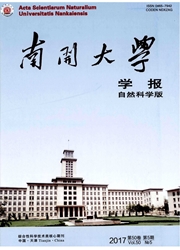

 中文摘要:
中文摘要:
马尔堡病毒的RNA基因组编码7种结构蛋白,其中核蛋白在基因组的复制和核衣壳形成中发挥重要作用,成为十分有吸引力的抗病毒药物潜在靶标.实验利用亲和质谱技术从甘草提取物中筛选马尔堡核蛋白的配体.首先从甘草粗提物中发现了可能与蛋白结合的配体甘草查尔酮A.在此基础上,对甘草中已知组分的单体混合物和甘草查尔酮A单体分别进行亲和质谱分析,验证了粗提物的质谱筛选结果.而后进一步利用SPR实验确认甘草查尔酮A单体对核蛋白靶标的结合作用,进而通过一系列生化实验发现该单体对马尔堡核蛋白热稳定性和构象均能产生功能性影响.实验发展的亲和质谱技术为从中草药提取物中直接筛选新型抗病毒药物分子提供了简便高效的新方法.
 英文摘要:
英文摘要:
The RNA genome of Marburg virus encodes seven structural proteins. Among them, the nucleoprotein (NP) has emerged as an attractive target for drug development because of its important role in viral genome replication and formation of the viral nucleocapsid. In this study, we developed a screening assay based on affinity mass spectrometry for ligand discovery for Marburg virus NP from TCM crude ex- tracts. Affinity MS screens resulted in the discovery of Licochalcone A as a hit of Marburg virus NP from Licorice extracts. Binding of Licochalcone A to the Marburg virus NP were confirmed by affinity MS anal- ysis of compound standard mixtures and the pure compound. SPR analysis was conducted to further vali- date the interaction of Licochalcone A with Marburg virus NP. This new ligand was shown to promote the thermal stability of NP and influence NP polymerization status. Taken together, screening of TCM or natural products for novel ligands to virus NP by the affinity MS approach would have strong potential in the discovery of innovative antivirus agents.
 同期刊论文项目
同期刊论文项目
 同项目期刊论文
同项目期刊论文
 期刊信息
期刊信息
